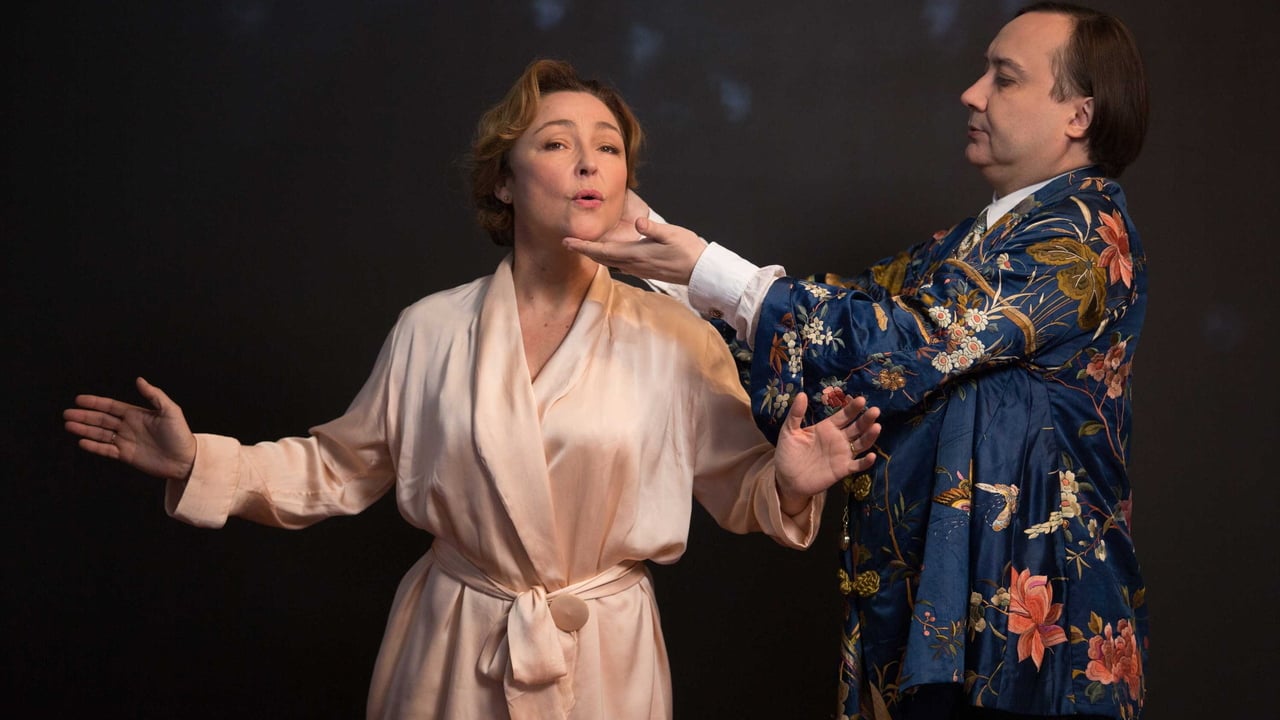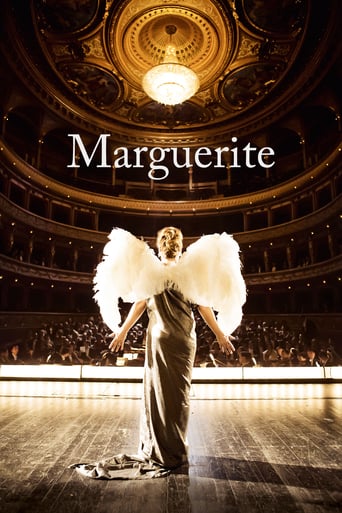

This comedy of manners was masterfully done. For a story about a woman who was an atrocious singer but didn't know it and performed publicly, it was delightfully light-handed. Catherine Frot was exceptional as Marguerite. She didn't portray the character as a silly, narcissistic woman as I'd feared but expected. She was portrayed as a passionate, thoughtful, lonely and yet vibrant woman who was just blissfully unaware of her lack of talent. Yes she was a terrible singer and we all laughed when she performed, but it was done with such feeling toward Marguerite that it never felt that I was being asked to laugh at her but rather the situation. I fell in love with all of the characters, even those who used Marguerite and those that tried to swindle her – they were just so well written and full of life. And you can't help but love those who supported and stood by her. The ending was also surprisingly heart-wrenching, but fitting and sadly satisfying.
... View MoreThe comedy of manners is the weapon of choice for satirising the wealthy and powerful. Its favourite target is vanity, like in the fairy tale Emperor's New Clothes where a vain ruler is fooled into believing that beautiful garments have been made for him only to display his pompous nakedness for all to see. The narrative of Marguerite (2015) is framed around this theme, except that instead of clothes the hapless victim is encouraged to believe she has a beautiful voice. In her case, the self-deception is less about vanity and more about her love of singing and the inability to hear her own voice.Marguerite is loosely based on the true story of American socialite Florence Foster Jenkins. This sumptuous art-house style French production portrays her as a wealthy and eccentric benefactor of the arts in 1920s Paris. She is easily manipulated by the flattery of others and obsessive about opera singing. She also loves her unfaithful and financially dependent husband who is incapable of telling her the truth about her voice and who always has an excuse for missing her recitals. Her friends and house staff protect her from the knowledge of how badly she sings in gratitude for her kindness and because she is a 'lovely lady'. The stakes are raised when Marguerite decides on a public recital where of course the audience cannot be stacked with grateful patrons. The resulting performance is a seat-squirming experience that fills both the on-screen theatre and your own cinema with painful laughter and vicarious embarrassment for someone who can be so cruel to music. The film itself becomes an operatic performance of pride's folly.This could have been an unbearable story made worse by intolerable singing, but it works well as a comically sad tale about a gullible woman who wants desperately to believe she can create beauty with her voice. The filming, sets and costumes evoke the era with authenticity and French actress Catherine Frot's subtle performance balances the sublime with the ridiculous. Frot's wide-eyed trust in others is both endearing and engaging as she draws us into her make-believe world that borders on madness. Some truly beautiful operatic voices create a haunting background score that only accentuates the appalling noise that comes from Marguerite's voice box. Its an entertaining story but don't be surprised if you catch yourself asking "what is so funny about bad singing?" and feeling embarrassed for laughing at another person's delusions.
... View More'Marguerite' was for me the most anticipated inclusion of the French Film Festival touring Australia as I write this review. In part due to the pithy and alluring plot line given in the booklet for the screenings, and in part as Catherine Frot was freshly known to me since seeing 'Haute Cusine' a couple of years back. I was really impressed with the subtle but powerful presence of Ms Frot on screen. I've become most enamored with the many wonderful actresses from France and this film and performance has already put Catherine Frot into an award winning position; confirming her long and distinguished career. Rather than give away too much of the plot; i'd would prefer to sing the praises of the panoply of elements that make this movie so memorable and commendable. It is beautifully staged and executed, with a faithful commitment to the period and a skillfully cast ensemble of actors to back the leading lady. I was especially impressed with Congolese actor Denis Mpunga who lends such a solid and fascinating literal support as Marguerite's butler. Michel Fau steals every scene he is in as an overly hammy opera singer; and Andre Marcon manages to both represent and challenge the archetype of a philandering husband. While the film does run long; a shade over 2 hours; for the most part it is compelling, intriguing, amusing, sad and thought provoking. How many movies can be described that way? There were moments where I was both laughing and crying; a result of powerful direction by Xavier Giannoli who also co-wrote the film, and of course the impeccable performance from Catherine Frot. There is enormous dignity that the actress conveys as well as a hapless and at times a quiet knowing which is hugely endearing and makes Marguerite neither a victim nor a focus for ridicule. La Frot has such cinematic presence and yet at times there is great stillness to the performance; and of course there is the full bodied musical pieces that anchor the film's structure and themes. There is a majesty to the film cinematically; and despite a couple of plot strands hastily thrown in and not satisfyingly completed, there is a potency and cogency to the script and to the film's overall running time. I feel it will be one of my favorites of 2016.
... View MoreFrom correspondence I've had over the years it seems that there are roughly a dozen people who tend to follow my reviews here and they will know in what high esteem I hold Catherine Frot, not least for her versatility which allows her to move effortlessly from the pathetically ditzy neglected wife in Un Air de famille to the mother from hell in Vipere au poing with virtually any and everything in between. Her first love is the stage - indeed she made her name in the stage version of Un Air of famille, which earned her a Moliere, plus a Cesar when she replicated her role, complete with dog collar, on celluloid - and for three years she has neglected the cinema for the theatre - I myself was lucky enough to see her in the Ingrid Bergman role in Cactus Flower (Fleur de cactus in French) barely a week ago, but now she is back on the screen in what I can only describe as a tour de force; Marguerite is a wealthy socialite in 1920s Paris who has an all consuming love for opera, so much so that she loves nothing better than performing arias for her society friends in salons. The problem, tragedy may not be too strong a word, is that she is totally without vocal talent yet for reasons best known to themselves her friends conspire to keep this knowledge from her and applaud every note and even pen fine reviews. Although the story is fiction - there may be a reason the character is named Marguerite Dumont; the actress Margaret Dumont, was the foil for Grouch Marx in the majority of the Marx Brothers films and was also a wealthy society lady with delusions of grandeur - it is clearly based on the life of Florence Foster Jenkins a wealthy American who also harboured the delusion that she was a world-class diva. Catherine Frot is outstanding and it may well be the finest performance she has given in the cinema, which is, of course, saying something. For some reason it appears that Meryl Streep is shooting very much the same story even as I write and this may well keep the Frot film off American - and possibly even UK - screens which would be unforgivable.
... View More